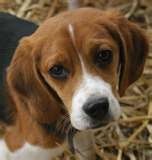Canine Incontinence
It is a misconception that it only affects older dogs
Canine incontinence is a serious medical condition that affects mostly older dogs, but can affect dogs of any age, gender, breed, or size.
At first signs, it can, make you as the owner angry, and then worried that there may be something terribly wrong with your best friend.
Incontinence in your dog will start to happen when your dog basically lacks the ability to control urination.
WHAT IS HAPPENING WITH CANINE INCONTINENCE
Some owners will even confuse this with a dog leaving a scent, which he does entirely by will to mark his territory.
A dog with canine incontinence will urinate not by choice and is quite often very unaware of what is actually happening, as they no longer may have control.
With this condition it is very important not to scold and get angry, although that will be your first temptation.
Watch them very close, as again this can be a very serious medical condition, and scolding them may only exacerbate the situation.
These indoor accidents associated with this ailment happen when your dog has a medical condition that generates more than the usual amount of urine,
When this occurs, the bladder of your dog can no longer contain it.
SEVERAL POTENTIAL CAUSES
There are several diseases that may be causing this, other than just a weakening bladder, such as Cushings disease and Sugar diabetes,
Bladder stones, Liver disease, and chronic liver failure as some examples.
In normal circumstances, a circular muscle at the end of your dog’s urethra will restrict the flow of urine.
As the urine fills the bladder, nerves send a signal that alerts your dog’s brain.
The brain than sends a signal to the let the urine flow, and your dog will urinate.
There are several treatments for this condition, and collagen injections are becoming more popular as a treatment for canine incontinence, as it is extremely effective.
YOUR DOGS NATURAL COLLAGEN
However, what about building your dog’s natural collagen to start with?
Collagen is a protein, and one of the thousands of proteins that live in both your dog’s body as well as your own.
It is also one of the most, if not the most, important protein that helps build and maintain the strength of the bladder.
To illustrate the importance of collagen, there is a tremendous amount of hemoglobin in red blood cells.
Yet there are multitudes of more collagen in your dog’s skin, teeth, eyes, heart, and yes, the bladder.
Collagen is essential for all parts of the body, and is strong white fibers, stronger per weight than steel wire, that along with elastin essentially bind your dog’s body together.
This protein is extremely important and that is why it is as effective as a treatment in canine incontinence.
Building your dog’s system early, or even later in life, is critical for your pet.
Vitamin C is essential for the building of collagen, and should be a must for the protection of your dog as a supplement.
For a human that is dying of scurvy, their body quite making collagen, but vitamin C rectified that as we are all aware.
It can do the same thing for your dog with canine incontinence.
The synthesis of collagen is structured, and it appears that Vitamin C not only affects each step, but it is essential in each and every step in this process of building these stronger than steel fiber like wires that help protect your dog’s body.
It only makes common sense if collagen is as effective as a treatment with this very serious condition, it can also be a pre-emptive measure to build it and strengthen it with vitamin supplementation.
 If your dog dribbles while sleeping they may have canine incontinence
If your dog dribbles while sleeping they may have canine incontinenceWATCH FOR THESE SYMPTOMS
The symptoms of this condition may start with leaking and or dribbling of urine, and will often occur when your dog is relaxing or sleeping.
The next sign will be a very visible wet spot under the dog’s sleeping place.
Other symptoms include your dog having trouble holding their urine as well as skin irritation around the genitals, and you may notice your dog constantly licking or cleaning the area to excess.
The most common form of this condition is an estrogen-responsive incontinence, and the common symptom is leakage of urine while your dog is asleep.
Trauma to your dog’s brain or spinal cord is another potential cause of this aliment in your pet.
However, with this condition, depending on the severity, your dog would also show symptoms of a loss of coordination, as well as a loss of control.
Some dogs with canine incontinence may have the need to urinate frequently due to a urinary-tract infection.
Bladder stones can also cause an irritation to the bladder causing an increased urge to urinate.
Tumors or polyps can also be causes and your pet not being able to control themselves.
Diuretic drugs used to treat heart conditions also stimulate the kidneys.
In young dogs with this aliment, the cause is usually congenital disorders such as a misplaced ureter, while diabetes mellitus is more common in middle-aged dogs.
Elderly dogs, especially those with arthritis, the natural elimination postures are painful, and they often revert to canine incontinence because of the pain.
Female dogs are more prone to this condition than males, and estrogen-responsive incontinence only occurs in spayed females.
SUMMARY
There is no real breed distinction with this ailment.
The most common form of treatment outside of collagen injections is Propalin, a name brand of Phenylpropalanine.
Topical creams, as well as antibiotics may also be treatments, but only your veterinarian can may the correct diagnosis.
Pet Meds for Canine Incontinence
Dog Vitamin Store
Kidney Stones in Dogs








